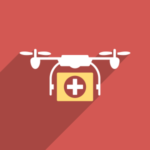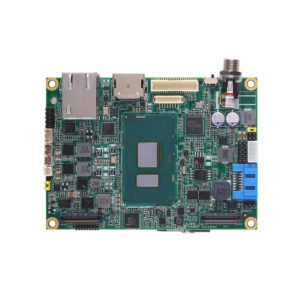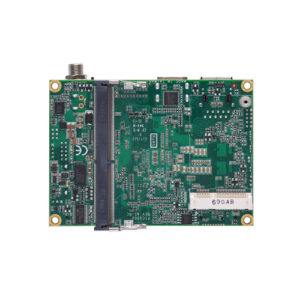Medical Drones Push Innovation in the Health Industry
 Medical drones can deliver items such as drugs, serum and small medical devices quickly and to remote areas. Where retailers are still testing drones for the delivery of large packages to their customers, medical drones are already being used in developing countries. Because medical supplies are often small and light, drones available today have the capabilities required. The time-critical nature of medical supplies is driving the development of a regulatory framework that will allow autonomous medical drones to fly long distances to bring life-saving supplies to patients.
Medical drones can deliver items such as drugs, serum and small medical devices quickly and to remote areas. Where retailers are still testing drones for the delivery of large packages to their customers, medical drones are already being used in developing countries. Because medical supplies are often small and light, drones available today have the capabilities required. The time-critical nature of medical supplies is driving the development of a regulatory framework that will allow autonomous medical drones to fly long distances to bring life-saving supplies to patients.
Deliveries Between Hospitals
A first step in the use of medical drones is likely to be deliveries between hospitals. The treatment of patients often requires the transfer of test samples or the delivery of medical supplies that may not be in stock everywhere. Such transfers could also take place between small regional hospitals with limited supplies and large health centers. The rapid transfer of samples to labs that are equipped to perform the required tests and the return of corresponding medication could save lives.
Drone transfers between hospitals are comparatively simple because the takeoff and landing sites are known and the route can be programmed. Drones would take off from a hospital roof or parking lot and use GPS to fly a pre-determined route. The landing site can be equipped to make sure the drone can come in safely and accurately. Time saved in a trip across a city with heavy traffic or from downtown to a remote regional health facility can be substantial and the cost would be low.
Deliveries to Accident and Disaster Relief Sites
The next step would be to enable medical drones to fly to a specific but previously unknown location to deliver required supplies. Typical applications could be to aid accident or disaster victims of all kinds. Technicians at the take-off site would enter GPS coordinates and the medical drone would find its way to the target site. Initially drones could drop the supplies in padded packages or with small parachutes but, as they become more sophisticated, the drones could identify potential landing sites near the accident and land autonomously. Drone could be one of the most effective logistical tools to distribute blood supply or related products to save lives affected by natural disasters or terrorist attacks.
Such deliveries would be especially useful in remote areas or places where ground access is limited, such as on islands, ships, or disaster sites. While first responders would attempt to make their way to the sites and take over patient care, emergency packages could help keep patients alive in the interval. Time-sensitive conditions such as heart attacks, shock and poisoning often require immediate attention and medical drones could bridge the gap between the medical emergency and when traditional medical help arrives.
Regulatory and Technical Challenges
While medical drones could already be placed in operation in some areas of the United States, FAA regulations currently limit the cruising height of drones and require line of sight control. Fully autonomous drones may fly higher than the limit and would certainly fly beyond the line of sight of the operator. The FAA is working on expanding drone permitting and several tests with autonomous drones are under way.
What the FAA eventually decides will be based on how safe and reliable drones turn out to be. Small drones such as those already considered for the delivery of light medical supplies are inherently safer than larger, heavier machines that can cause considerable damage if they fail. But even small, light drones must have the electronics necessary to guide them reliably and allow them to react appropriately to situations. An on-board computer of an autonomous drone must be powerful enough to process the many different variables quickly and accurately to make decisions on subsequent actions. It must be able to operate reliably in harsh conditions, i.e., wide ranges of temperature and vibration. It must also be light in weight to allow the drone to fly. When the computer hardware guiding medical drones are of industrial grade, highly intelligent and operating in a consistent and predictable manner, the FAA is more likely to issue approvals for such autonomous drones.
The Axiomtek Embedded Board
A single board computer such as the Axiomtek’s Pico-ITX form factor board can take on autonomous drone control with its powerful, highly advanced processors, extended input/output capabilities and its light weight. One of Axiomtek’s PICO embedded boards has already been selected for an autonomous drone application in that inspects wind turbines in the United States. The drones initiate their own procedures to inspect wind turbine blades using both audio and visual criteria as a part of their inspection processes, taking about 15 minutes to inspect the blades of a turbine, gathering data required for reporting for subsequent maintenance and repair.
The specifications for these drone controls were very similar to what is required for medical drones. Axiomtek’s PICO boards are light. For example, PICO512 weighs about 135 grams (less than 5 ounces), with a thickness of 1.6 mm and can operate in temperatures ranging from -20°C to +70°C (-4°F to +158°F). The board offers scalable 7th Generation Intel® Core™ i3/i5/i7 or Celeron® processors and up to 16 GB RAM. Extensive expansion capabilities and rich input/output interfaces complement the powerful processing capability to meet complex requirements of demanding applications such as autonomous medical drone.
| CPU | 7th generation Intel® i7/i5/i3 & Celeron® processor onboard |
| Chipset | SoC integrated |
| System Memory | 1 x 260-pin SO-DIMM DDR4-2133, up to 16GB |
| BIOS | AMI |
| COM | N/A |
| USB | 1 x USB 2.0 |
| Display | 1 x HDMI 1 x LVDS |
| Storage | 1 x SATA-600 |
| Expansion | 1 x full-Size Mini PCI Express Mini Card with mSATA 1 x PCIe x1, 1 x LPC, 1 x DDI, 4 x USB3.0,1 x HD audio and 1 x SMBus (through expansion connector) |
| Others | TPM1.2 SMI2C |
| Battery | Lithium 3V/220mAH |
| Power Input | DC Jack +12V DC-in only AT Auto Power On function supported |
| Power Requirements | i7-7600U: +12V @ 2.5A i5-7300U: +12V @ 2.4A i3-7100U: +12V @ 2.2A CEL-3965U: +12V @ 1.7A |
| Watchdog Timer | 65535 levels, 1 ~ 65535 sec. |
| Hardware Monitoring | Yes |
| Operating Temperature | -20°C ~ +70°C (-4°F ~ +158°F) |
| Relative Humidity | 10% ~ 95% relative humidity, non-condensing |
| Dimensions | 100 x 72 mm |
| Board Thickness | 1.6 mm |
| Certifications | CE |
With the PICO512 and other of Axiomtek’s comprehensive product lines of compact form factors as well as exceptional design assistance services, Axiomtek can deliver the solutions needed for drone-related applications in the medical field with ease. The product engineering and OEM/ODM services teams at Axiomtek can help ease the burden of medical device manufacturers by offering both the required hardware and the customizations and additional design services required. Key Axiomtek products for other medical applications include embedded systems, touch panel PCs (GOT product series), and the EN/UL60601-certified touch panel computers (MPC product series).
About Axiomtek Medical
Axiomtek has designed and manufactured advanced electronics for industrial and medical use since 1990. Customers have benefited from the company’s experienced engineers and broad product range to help them develop high-quality medical equipment.
The Axiomtek products – including embedded motherboard, embedded systems, touch panel PCs and medical-certified touch panel PCs – are continuously enhanced to take advantage of the latest technology. When combined with the company’s personalized design and value-added services, medical device design expertise, global footprint, R&D resources, and regional support teams, Axiomtek can support medical OEMs/ODMs with their projects of any size and complexity. Board-level or system-level design services for each customer are supported by an assigned, dedicated team consists of project manager, product manager, application engineer, account support representative, and more. Axiomtek’s customer-focused team is ready to assist and ensure easy product development and fast deployment time. Axiomtek Medical’s mission is to provide its medical device OEM/ODM customers worldwide with advanced, powerful, reliable solutions, and exceptional services.




